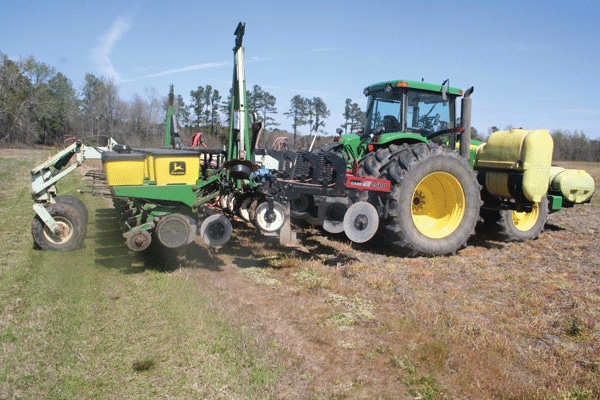
• Tennessee has been losing an average of 1,300 family farms a year. That’s an average of 100,000 acres removed from productivity annually.• To date some 20 workshops have been presented to some 644 landowners across the state. Participants have ranged from first-generation farmers to those who have worked their family’s Century Farm for all their lives.• The Partnership’s next major event is the Tennessee Farmland Legacy Conference on Nov. 11-12 in Pigeon Forge, Tenn. At the conference farmers, landowners and community leaders will have the opportunity to learn about protecting and growing today’s farms for tomorrow’s families and communities.
October 18, 2010

Farmers often fail to pass their farmland to the next generation. Maybe there’s a lack of interest in farming by other family members or an inability to make the family farm a profitable operation.
Perhaps the local communities have failed to make working farms welcome by passing unfavorable ordinances or zoning or by allowing imminent domain to break up valuable tracts. Whatever the reasons, the trend is evident and Tennessee is among the states attempting to address the issue.
“Tennessee has been losing an average of 1,300 family farms a year. That’s an average of 100,000 acres removed from productivity annually,” says Alice Rhea, a University of Tennessee Extension farm management specialist. Rhea and a broad team of UT faculty and Extension agents (Michael Wilcox, Jane Howell Starnes, Laura Howard, Christopher Clark, Alan Galloway, Dena Wise, and Christopher Sneed) have toiled to author a guidebook and present a series of estate planning workshops for those interested in exploring plans for the future use of their land.
To date some 20 workshops have been presented to some 644 landowners across the state. Participants have ranged from first-generation farmers to those who have worked their family’s Century Farm for all their lives.
UT Extension is one of 12 organizations that have joined to dedicate resources for the preservation of the state’s farmland. The Tennessee Farmland Legacy Partnership was formed to encourage both farm-level and community-level planning to promote the preservation and viability of working farms in Tennessee.
Partnership members, including the Tennessee Department of Agriculture, the Tennessee Farm Bureau Federation, Cumberland Region Tomorrow and the Land Trust for Tennessee, believe the future of Tennessee’s $3 billion agriculture industry depends on the ability of exiting farmers to transition their land and resources to new generations of farmers, some of whom have no access to affordable and productive land.
Another major event
The Partnership’s next major event is the Tennessee Farmland Legacy Conference on Nov. 11-12 in Pigeon Forge, Tenn. At the conference farmers, landowners and community leaders will have the opportunity to learn about protecting and growing today’s farms for tomorrow’s families and communities.
Prior to Nov. 1, for a modest $50 ($25 for farmers), participants may register to attend presentations on farm estate planning, profitability and timber management for landowners and planning techniques that protect farmland while enhancing economic growth for community leaders. Presenters will explain how communities and farmers can benefit from working together.
Some of the speakers scheduled to present are Ron Hanson from the University of Nebraska and Peggy Kirk Hall from the Center for Policy Innovation at Ohio State University. Hanson, a nationally known speaker, will talk about the issues and challenges of farm transfer from one generation to the next and Hall, legal director for the Center, will be speaking about the legal issues that pose threats to the long-term viability of today’s agriculture.
Discussion topics will also include tools for protecting farmland, incentives for forest landowners, as well as other agriculture and community issues affecting today’s farmers.
Participants may register online for the Tennessee Farmland Legacy Conference at www.farmlandlegacy.org or by calling 865-974-0280 or 1-800-429-7700. Registrations will be accepted after Nov. 1, but the fee increases to $100 ($50 for farmers).
Planning for the future is essential, says Rhea. She advocates that families take an active role in succession planning. “Competing interests among family members, economic and development pressures or a combination of reasons make the topic difficult for some to approach,” says Rhea, “but failing to plan is not generally a good solution for the family or for society. It may leave us with a future shortage of productive farmland.”
You May Also Like



